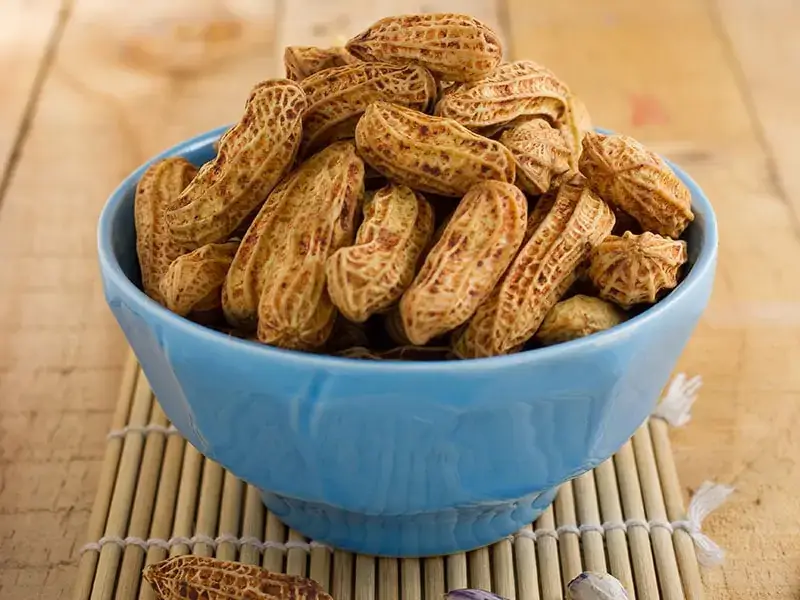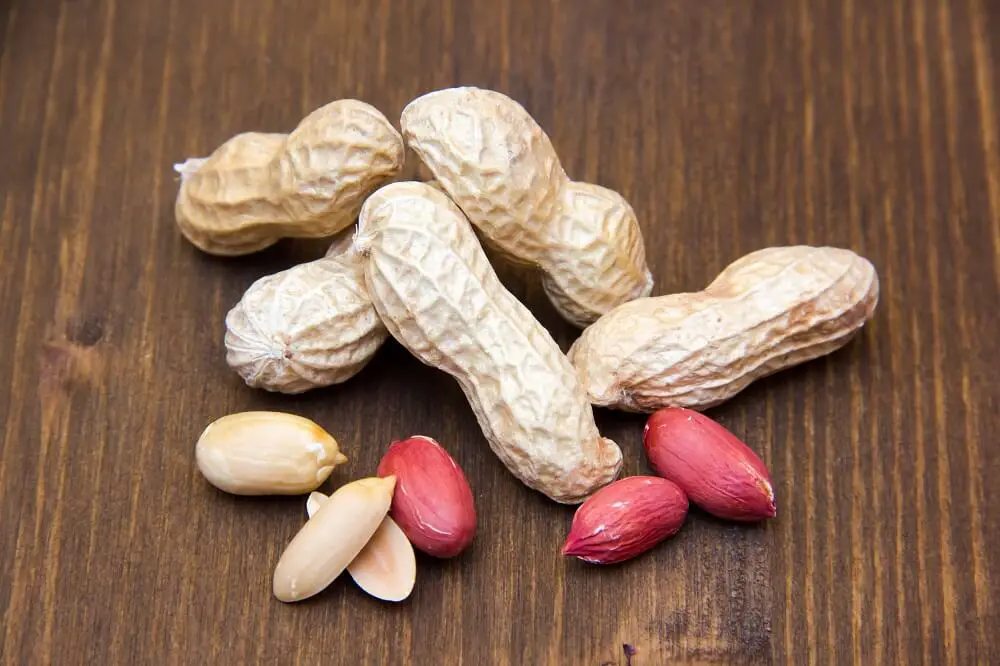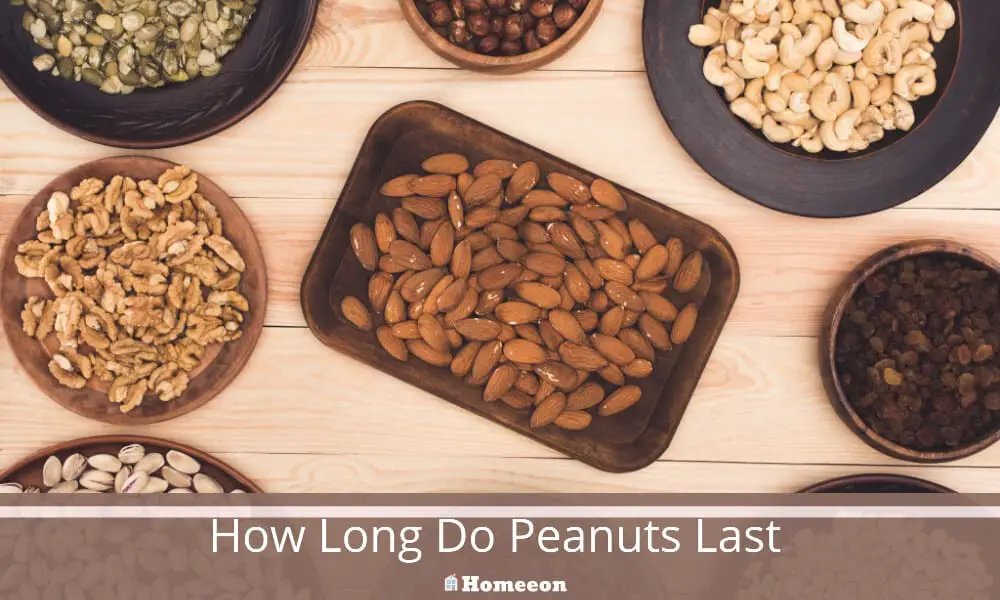Last Updated on August 13, 2023 By Emma W. Thomas
Raw peanuts last about a year in a cool, dry place. Roasted peanuts stay good for 3-6 months at room temperature. Refrigeration can extend their shelf life by up to 9 months. Always check for signs of spoilage before consumption.
Overview of Peanuts Shelf Life
| Peanut Product | Pantry Shelf Life | Refrigerator Shelf Life | Freezer Shelf Life |
|---|---|---|---|
| Raw Peanuts | 6-9 months | 1 year | 2 years |
| Roasted Peanuts | 6 months | 1 year | 2 years |
| Peanut Butter (Opened) | 2-3 months | 6-9 months | Not recommended |
| Peanut Butter (Unopened) | 1 year | Same as pantry | Not recommended |
| Peanut Oil | 1 year | 1 year if unopened | Not recommended |
How Long Peanuts Last In Various Conditions

The shelf life of peanuts varies according to how and where they are stored. Here are some storage options and how long they can last in these conditions.
1. Unshelled Peanuts
Peanuts in their shell can last up to four months at room temperature. If you store them in the fridge, they will last for up to 1 year, and two years if stored in the freezer. When storing unshelled nuts, put them in an airtight container to avoid sucking in moisture, and extend shelf life.
2. Shelled Peanuts
If you remove peanuts from their shell, they will last for about one month; if you store them in a fridge, expect them to last for a year or two years in a freezer. If you wish to keep them, fresher, for longer, store them in an airtight container.
3. Bottled Or Canned Peanuts
When peanuts are put in a sealed can or bottle, their shelf life is extended. They can last for up to two years at room temperature, three to four years in the fridge, and eternity in the freezer. Canned peanuts remain fresh since moisture and fungus cannot get in.
4. Boiled Peanuts
Boiled peanuts can last for three days at room temperature since oxidation causes their taste and texture to deteriorate. If you freeze them, they can last for about three months, but we do not advocate storing them that long.
5. Roasted Peanuts
Roasted peanuts can last for three months past their expiration dates. If stored in a freezer, this time is extended by three more months. If your roasted nuts still feel fresh and nutty, they are probably suitable for consumption
6. Honey- Coated Peanuts
Honey-tossed nuts are tasty and long-lasting; they can last for three months when stored at room temperature in a sealed bag or container. If stored in the fridge, they can last for six months.
Can You Freeze Peanuts?
The answer is yes, you can! Here’s an in-depth look at everything you need to know about freezing peanuts.
1. Long-Lasting Freshness
Freezing peanuts is a great way to prolong their shelf life. Despite the common misconception, peanuts – like all nuts – do not remain fresh indefinitely if left in pantry storage. However, when you freeze them, you can extend their life up to one year!
2. Maintains Nutrient Value
Another advantage to freezing peanuts is that they preserve their nutritional value. Peanuts are packed with healthy fats, protein, fiber, and several essential minerals and vitamins. Freezing does not affect these nutrients, which means you won’t lose any health benefits.
3. Flavor Preservation
Freezing peanuts won’t affect their taste either. When properly stored, they will maintain their distinctive nutty flavor. So, you don’t have to worry about taste alterations after freezing.
Easy To Freeze
The process of freezing peanuts is extremely easy. All you have to do is place shelled or unshelled peanuts in a freezer-safe bag or container, remove as much air as possible, seal it shut, and place it in the freezer.
5. Quick Defrost
When you need peanuts for a recipe, simply take the desired quantity out of the freezer and allow them to thaw at room temperature for a few hours or overnight in the refrigerator.
6. Reduces Waste
If you find yourself with an oversupply of peanuts, rather than wasting them, you can freeze the surplus to be used later. This strategy helps reduce food waste and save money.
7. Versatile Use
Just because peanuts have been frozen doesn’t limit their use. Once thawed, they can be used in a variety of dishes such as cookies, peanut butter, or savory peanut sauces.
In conclusion, not only can you freeze peanuts, but there are also numerous benefits to doing so. From preserving their freshness and flavor to reducing food waste, the advantages make it a good choice for peanut lovers.
How Do I Tell If Peanuts Have Gone Bad?
Now that you know how long a nut can last in various storage conditions, it is essential to know how to test for freshness. Sometimes, you find nuts in your pantry that have no expiry date, and you can’t recall when you got them. Here’s how to know if the nuts are still safe for consumption.
1. Smell
Due to high oil content, nuts do go bad, and they can be harmful to your health. Spoiled nuts have a sour odor that’s similar to curd or sour milk. If the nuts were in an airtight container, they’d likely have a gassy or paint-like smell.
2. Texture
Fresh nuts have a solid and hard texture. If nuts feel soggy or shriveled when touched, chances are they have gone bad. Soggy nuts have an unpleasant taste in your mouth and cause stomach irritation to some people.
3. The Appearance Of Mold On The Surface Of The Shell Or Nut
If you notice discoloration, black spots, or mold on your nuts, they have gone rancid. When you don’t notice any change in appearance or texture in peanuts, tasting is a sure way to tell if they have gone bad. Rancid peanuts have a repelling taste that is hard to miss.
How To Store Peanuts And Extend Their Shelf Life

Peanuts are best stored in a cool atmosphere away from moisture and other contaminants. Refrigerating these nuts is a great way to extend their shelf life by months. It is important to note that nuts absorb moisture from the surrounding environment, thus the need to keep them sealed up. Storing nuts properly ensures you eat fresh and healthy peanuts, save on food costs, and minimize wastage.
When storing nuts, please put them in an airtight glass container with a lid. This helps prevent odors from other food items from leaking in. You can also use a sealed plastic bag to store peanuts in the freezer.
If storing peanuts in your pantry, make sure they are away from sunlight, moisture, and foods with a strong aroma. When unshelled, peanuts can last in your pantry for a few months, but when shelled, they can last for a maximum of one month. If you want to store nuts for years and remain fresh and crunchy, freeze them in an airtight container below 0 degrees Celsius. You can thaw peanuts and refreeze them frequently without them losing their texture and flavor.
Frequently Asked Questions
1. What Happens If You Eat Rancid Peanuts?
2. What Are The Nutritional Benefits Of Peanuts?
3. What Happens When You Eat Excess Peanuts?
In A Nutshell
Peanuts are healthy snacks that are popular with most people. If you notice that nuts are rancid, discard them. The tell-tale signs of rancid peanuts are moldy or shriveled nuts. Before ingesting nuts, make sure you smell them to know if they are fresh. Always store nuts in a sealed bag or an airtight container. If you want nuts to last the longest, freezing them is a great idea. Roasted, honey-coated, and flavored nuts need extra care when being stored. If you don’t want nuts to go bad, repurpose them into peanut butter or oil.
References:
https://www.canitgobad.net/can-peanuts-go-bad/
https://eatdelights.com/peanuts-shelf-life/
Emma is a graduate of Domestic Science or Family and Consumer Sciences (Home Economics) from the University of Wisconsin. She has 7 years of experience Working with the strategic section of BestBuy and now writing full-time for Homeeon.
From Managing the Home, Interiors, Cleaning, and Exteriors to Gardening and everything about Making A Home Liveable – is her passion and this Homeeon is the result of this.
Emma loves decorating her home with the best stuff found online. She cares about quality over anything and writes reviews about them here in Homeeon. Get in touch with her over Pinterest.
Keep reading her blogs.
